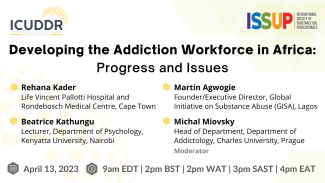Developing the Addiction Workforce in Africa: Progress and Issues

ICUDDR and ISSUP would like to invite you to attend our upcoming webinar on Developing the Addiction Workforce in Africa.
Time: 9AM EDT | 2PM BST | 2PM WAT | 3PM SAST | 4PM EAT
Register for the Webinar
The aim of this Webinar is to share the process of developing addiction education programs in Africa from needs assessment through implementation and connection with the workforce. As an introduction we will describe a proposed taxonomy of university addiction education programs. We will then describe implementation processes, identify challenges, reference the role of the ISSUP National Chapter and discuss how the challenges are being addressed. Successful program development in low resource countries can inform work force development in the rest of the world.
Presentations:
Needs assessment and preparatory work for addiction science programs at universities; Experience of universities in South Africa - Rehana Kader, Life Vincent Pallotti Hospital and Rondebosch Medical Centre, Cape Town, South Africa
Currently South Africa has only two universities in the country that offer a formal post graduate diploma in addictions care, which is inadequate to meet the need. The development and implementation of academic curricula is a very complex, challenging, and often difficult and complicated process. To ensure the success and sustainability of new programs, it is important to follow a systematic process.
The South African Chapter of ICUDDR’s aim is to engage more universities in the country to develop and implement academic curricula in addiction science. Hence, the South African ICUDDR undertook the first phase of conducting a formal needs assessment of universities throughout the country to identify the needs of universities regarding addiction science training and curriculum development. This needs analysis took inventory of the addiction science education and training landscape and looking at gaps or absence of addiction programmes.
The data obtained from the needs assessment allows the South African ICUDDR to propose recommendations and provide support to assist these universities with the next phase of curriculum development and adaption of addiction programmes as well as developing academic staff competencies in the addiction field.
Needs include understanding addiction, curriculum development and implementation support. Plans to systematically address each of these needs are being executed across multiple areas of the country.
Addiction Curriculum in Nigerian Higher Education System – Contextualizing Western-based methods and approaches for responsiveness and effectiveness - Martin Agwogie, Founder/Executive Director, Global Initiative on Substance Abuse (GISA), Lagos, Nigeria
Drug use is of a public health importance in Nigeria. Problematic drug use has been linked to health, social and security issues in Nigeria according to recent literature.
One of the evidence-based ways to address the national drug use problem is by building a health workforce and strengthening the human resources available via the development of a menu of courses for competency-based multidisciplinary roles in addiction science. In the pursuit of this goal, it is important to contextualize Western-based models of pedagogy in order to develop an addiction study curriculum that is sensitive and responsive to local and national needs. A case study using desk review, in-depth interviews and focus group discussions with key stakeholders was conducted.
Raised awareness about (1) the need to contextualize Western models into local realities; (2) to establish a theory-driven framework for the identification of barriers and opportunities to develop addiction curriculum sensitive and responsive to local current and future needs.
Drug use is of a public health importance in Nigeria. Problematic drug use has been linked to health, social and security issues in Nigeria according to recent literature.
Piloting an implementation protocol delivered as an online course: African leadership in addiction workforce development - Beatrice Kathungu, Lecturer, Department of Psychology, Kenyatta University, Nairobi, Kenya
One of the key mandates of ICUDDR is the transfer and adaptation of science-based knowledge regarding prevention and treatment of substance use disorders through the development of university-based drug demand reduction (DDR) academic programs. This goes hand in hand with ISSUP’s mission to develop and professionalise the networks of prevention, treatment and recovery support professionals.
Faculty from African universities informally expressed a need for capacity building in development of such DDR academic programs. In response to this, through a collaborative effort between ICUDDR and the African regional leadership, a formal needs assessment was carried out that identified specific areas of need. This was followed by the designing of a course outline targeting these specific areas. Experts from the region were then sourced to develop a practical course (named ‘Developing university based drug demand reduction academic programs: A practical guide’) as well as concurrently pilot the newly developed course.
The process is being successfully undertaken with consistent participation of 6 African countries (Nigeria, South Africa, Botswana, Malawi, Kenya, and Uganda) in the piloting and is anticipated to be completed in March 2023.
It is hoped that once the piloting and reviewing processes are done, the course will be disseminated to the rest of the universities in Africa and to other interested regions of the world as a way of building capacity for adaptation and implementation of evidence based knowledge into university based academic programs and connecting with the existing workforce in the countries.
Moderator:
Michal Miovsky,
Head of Department, Department of Addictology, 1st Faculty of Medicine, Charles University, Prague, Czechia
Webinars and online events delivered and hosted by the International Society of Substance Use Professionals (ISSUP) are provided for informational purposes only. They are educational in nature and do not constitute medical advice, diagnosis or treatment.